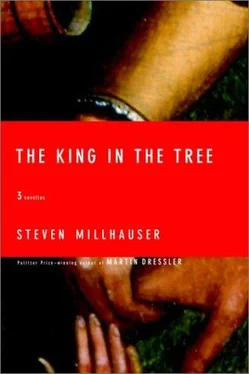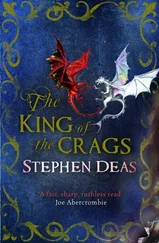Under a pear tree lay Tristan and the Queen, asleep. They lay on white linen, beneath a red silk coverlet brocaded with gold lions. In the green shade they lay mouth to mouth, embracing. The coverlet was partly cast aside, revealing their naked arms and upper bodies. The Queen’s breasts were pressed against Tristan’s breast. What startled me was the Queen’s hair, unbound, naked, wild, like some yellow eruption, pouring along her shoulder, bursting over Tristan, burning along the coverlet.
They were breathing quietly. I could not bear to look at the King’s face.
The King bent toward me and whispered harshly, “We must find witnesses.” He turned and strode away.
I withdrew my dagger and crept up to the sleeping pair. As I bent over Tristan, I imagined someone watching from a tree: the murder in the garden. Carefully I laid the dagger with its jeweled handle across his naked neck. Then I rose and followed the King through the hedge paths.
Why did the King leave? He left because, although he had caught them red-handed, and had every right to kill them on the spot, he had so long imagined this very scene that it must have struck him as familiar, unsurprising, perhaps a little disappointing. He left because, from the instant he saw them, he entered an unhappiness so deep that nothing could relieve him. He left because he was a just King who, although he had caught his wife and nephew lying naked under a pear tree, did not wish to condemn them to death unfairly, in the anger of the moment and in the presence of a single witness known to be his friend, for there might, even now, be an explanation that had not occurred to him and that would reveal them to be innocent. He left because he could not bear a life without the Queen, without Tristan. He left because, although he wished to return with his barons and murder the lovers in their bed, he also wished to offer them a chance to escape. He left because his heart was broken. He left because, in the first instant of seeing them there, before the knowledge of their treachery entered his heart, he had experienced a kind of awe before the beauty of Tristan, the beauty of Ysolt, two lovers under a pear tree, in a garden, out of this world.
These were my thoughts as I followed the King through the hedgerows and back across the garden to the door in the tower.
Inside the door, Modor stepped from the shadows. He had drawn his little sword, which he held high in his excitement. “You saw them!” he cried, his face savage with glee.
The King, uttering a cry, struck with his sword. The blow severed Modor’s hand cleanly from his wrist. Modor gave a high, unpleasant scream and bent over violently with his bleeding stump pressed against his stomach. I looked at the little hand lying palm upward on the floor beside the fallen sword, which lay quite close to it. Modor, shrieking like a child, stumbled away into the shadows.
As he strode toward the great hall to fetch witnesses, the King told me that Modor had ridden out to the forest with the news that he had seen the Queen and Tristan go into the garden. From a ladder at the top of the garden wall the dwarf had watched them lie down under the pear tree.
When we returned to the garden in the company of four barons, we found the Queen lying alone under the tree, with the coverlet up to her neck. In terror she looked up at the six of us standing over her with drawn swords. It was evident she expected to be murdered.
The barons looked at the King. The King looked at the Queen. Without a word, he turned and headed back out of the garden.
No longer does the King leave the castle. He walks in his garden, shuts himself up alone in his tower, stares unblinking in the chapel, presides in silence at dinner beside the silent Queen. Sometimes he stands on the wall walk, looking out over the battlements. Only at meals and at morning mass is he seen with the Queen. They never look at each other.
She, for her part, spends much time in the women’s quarters, embroidering among her companions, or in her tower chamber, with its window looking down upon her garden.
At night, in the royal chamber, the King takes his pleasure of the Queen. But can it be correct to say that he takes his pleasure? Is it not more accurate to say that he takes his pain? For when he lies with the Queen, does he not hear, in the bed beside her, the breath of Tristan, does he not feel, beneath his palm, the back of Tristan’s hand?
Never have the King and Queen been less alone.
Having spared the Queen, the King can do nothing but bear witness to her unhappiness, her uninterrupted desire for Tristan. This form of suffering, which is unbearable, is slightly less unbearable than the suffering that would have been his if he had condemned her to death, since he is left with the hope, however delusory, that a change will come over the Queen, that in the course of time she will begin to forget Tristan.
Thus the King devotes himself to a life of suffering for the sake of a future in which he does not believe.
It is also possible that he wishes the Queen to witness his own suffering, which cannot happen if she is dead.
Is it a wonder that they can’t bear to look at each other, in the light of day?
Last night I walked out into the orchard. I had not walked there for many days. The air was cool and fresh — a touch of autumn — and as I made my way along the wagon paths, under a dark sky brilliant with stars, I recalled the night when I saw Tristan and the Queen walking not far from me among the trees — walking so slowly that they were scarcely moving. I recalled the picture vividly, but for some reason I was unable to recapture the sensations that had been stirred in me then. Had they been illusory, those stirrings and wonderments? Had they perhaps been used up? I was pondering these questions when I found myself in a familiar place, not far from the fence of pointed stakes. I recognized the broad apple tree in whose branches the King and I had hidden ourselves, like boys at play.
On a sudden impulse I reached up to a branch and pulled myself into the tree. I climbed through branches heavy with ripe apples until I was nearly at the top. In one direction I could see over the palisade of stakes into the royal forest; in the other I could see, beyond the moonlit orchard stretching away, the pale, towering wall of the castle. In memory I heard the King’s voice crying, “Come down, Thomas! What the devil are you doing up there?” and I was wondering how I might reply when I became aware of sounds in the near distance. Quickly I withdrew into the darkness of the leaves.
Two figures came into view, whom I recognized at once as the Queen and Brangane. I was divided between the desire to reveal myself, for I had no wish to spy on the Queen, and the desire to remain hidden, for how could I explain my presence to her, in the orchard, at night, in the trysting tree? As I held myself back, the women came up to the tree. I saw that Brangane was carrying a bundle of some kind. The Queen stood staring at the trunk as if she were imploring it to speak, while Brangane unfolded her bundle, which proved to be a quilt and coverlet. In the moon-speckled shade of the apple tree, the Queen lay down and closed her eyes. Beside her Brangane stood guard, like a crossbowman on a castle wall. They did not speak.
High among the apple branches I looked down on the sleeping Queen, who lay with her head turned slightly to one side. Her face, haughty and sorrowful in daylight, looked mild and peaceful now — the face, almost, of a sleeping child. I was struck again by the mystery of her beauty, as it streamed up at me from the foot of the tree. It came over me that I too was guarding her, as she slept her strange sleep, under the trysting tree. Only then did it all come back to me, the night when I saw them in the orchard, the wonder, the stillness, the moment when the sky was about to crack open and reveal a dazzling light.
Читать дальше












